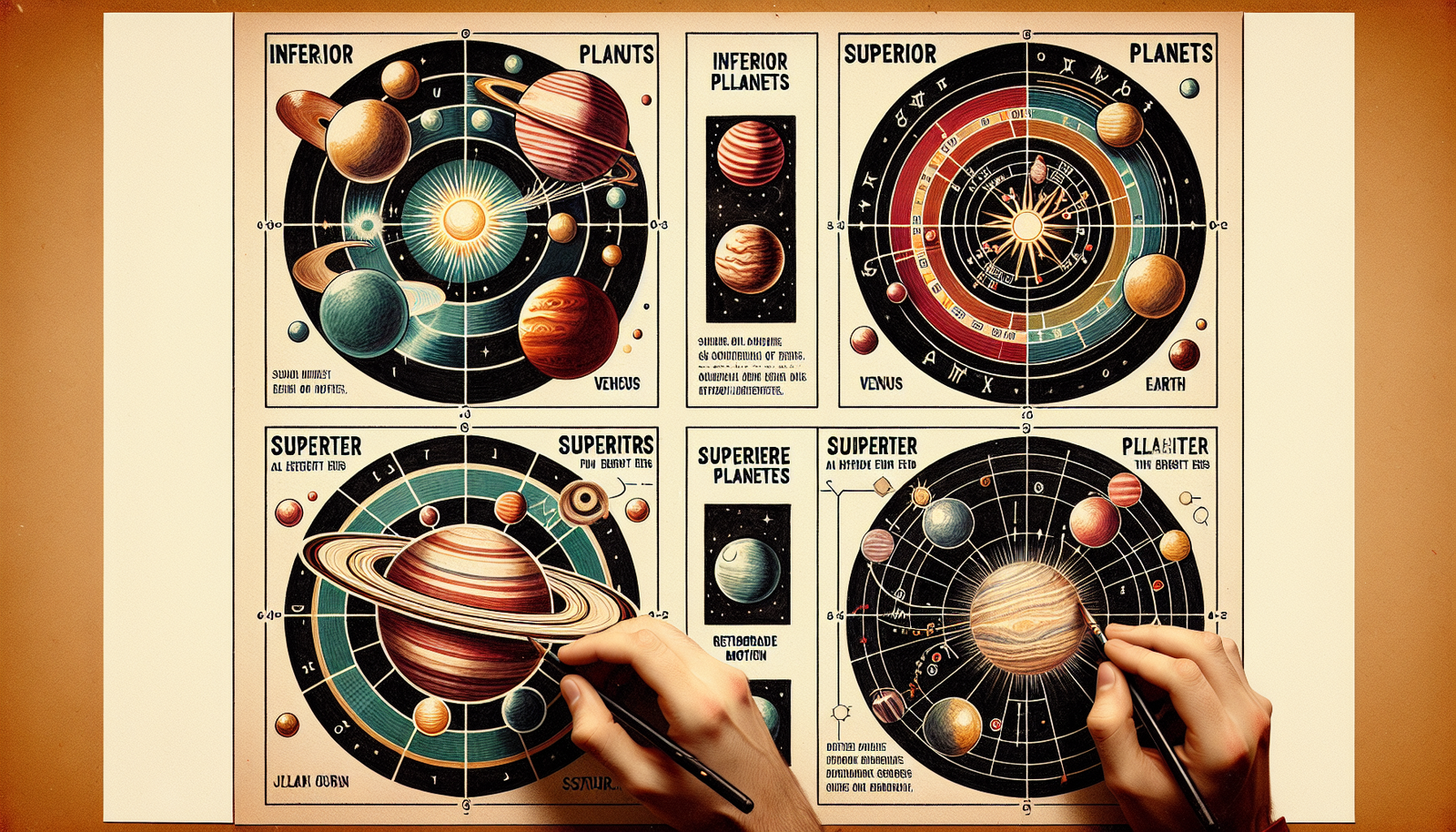Astrology is a fascinating field that explores the connection between celestial bodies and human experiences. Among the essential concepts in astrology are the distinctions between Inferior and Superior Planets. Each planet has its unique attributes and influences that can shape our personalities and life paths. In this blog post, we will delve into the meanings and significance of these planets, offering insights into how they relate to your astrological chart.
What Are Inferior and Superior Planets?
In astrology, planets are categorized based on their distance from the Sun and their visibility from Earth. The two primary categories are:
- Inferior Planets: These are planets that orbit closer to the Sun than Earth. They include Mercury and Venus.
- Superior Planets: These are planets that orbit farther from the Sun than Earth, such as Mars, Jupiter, Saturn, Uranus, Neptune, and Pluto.
This classification is significant because it influences how these planets operate and affect our lives. Understanding the characteristics of these planets can give you insight into your own traits and life experiences.
The Influence of Inferior Planets
Inferior planets, notably Mercury and Venus, have a special place in astrology due to their proximity to the Sun. Their combined influence is often about personal connections and communication. Let’s look at each one more closely:
Mercury
Mercury is the planet of communication, intellect, and reason. Here are some key traits influenced by Mercury:
- Communication Skills: Mercury enhances how we share our thoughts and ideas. Those with strong Mercury placements tend to be articulate and quick-witted.
- Analytical Thinking: This planet encourages logical reasoning and the ability to dissect complex issues.
- Adaptability: Mercury’s influence often leads to flexibility in thoughts and actions, allowing us to navigate different situations effectively.
Venus
Venus embodies love, beauty, and harmony. Its influence can be seen in matters of the heart and aesthetics:
- Relationships: Venus governs attraction, romance, and our social interactions. This planet plays a crucial role in how we relate to others.
- Aesthetic Appreciation: Individuals with strong Venus influences often have an eye for beauty and art, appreciating forms that are visually appealing.
- Value Systems: Venus shapes our desires and what we value in life, influencing our spending habits and emotional attachments.
The Influence of Superior Planets
Superior planets, being farther from the Sun, represent broader themes and long-term influences. Let’s explore each one:
Mars
Mars is the planet of action, aggression, and desire. Characteristics include:
- Drive and Ambition: Mars ignites our passion, giving us the energy to pursue our goals.
- Aggression: The influence of Mars can lead to confrontational or assertive behavior when driven by unchecked impulses.
- Competitive Nature: Individuals influenced by Mars often display competitiveness and a strong desire to succeed.
Jupiter
Jupiter symbolizes growth, expansion, and good fortune. It carries significant energy in our lives:
- Optimism: Jupiter infuses a sense of hope and positivity, encouraging a broader perspective on life.
- Expansion: It promotes growth, whether in education, travel, or personal development.
- Generosity: Jupiter encourages sharing and kindness, influencing how we connect with others and contribute to the community.
Saturn
Saturn is known for its lessons of discipline, responsibility, and structure:
- Boundaries: Saturn helps us understand limits and boundaries, teaching us to respect rules and structures.
- Maturity: With Saturn’s influence, we learn responsibility and the importance of hard work in achieving our goals.
- Challenges: This planet often brings challenges that prompt growth and self-reflection.
Uranus, Neptune, and Pluto
As modern planets, Uranus, Neptune, and Pluto possess unique energies and themes:
- Uranus: Represents innovation, rebellion, and sudden change. It’s associated with progressive thinking and breaking free from conventions.
- Neptune: Symbolizes dreams, intuition, and spirituality. It deepens our connection to our inner selves and fosters creativity, enticing many into the world of art and mysticism.
- Pluto: This planet is all about transformation and regeneration. Pluto’s influence can lead to profound change, often requiring us to confront our fears and shadows.
How to Utilize the Knowledge of Inferior and Superior Planets
Understanding the roles of these planets in your astrological chart can lead to personal growth and self-awareness. Here are some practical ways to harness their energies:
- Self-Reflection: Analyze how the traits associated with these planets resonate with your life experiences.
- Set Goals: Use the energies of Mars and Jupiter to motivate yourself in personal and professional undertakings.
- Embrace Challenges: Recognize Saturn’s lessons and see challenges as opportunities for growth and maturity.
- Nurture Relationships: Consider how Mercury and Venus influence your communication and emotional connections with others.
Conclusion
Inferior and Superior planets provide valuable insights into our personalities and the challenges we face throughout life. Whether it’s through the communicative influence of Mercury, the beauty of Venus, or the transformative power of Pluto, each planet has something significant to teach us. By understanding their roles and influences, we can explore our strengths and weaknesses, fostering growth in our personal journeys.
So, the next time you look at your astrological chart, remember the significance of these planets. Allow their energies to guide you toward a deeper understanding of yourself and your path forward in life.

